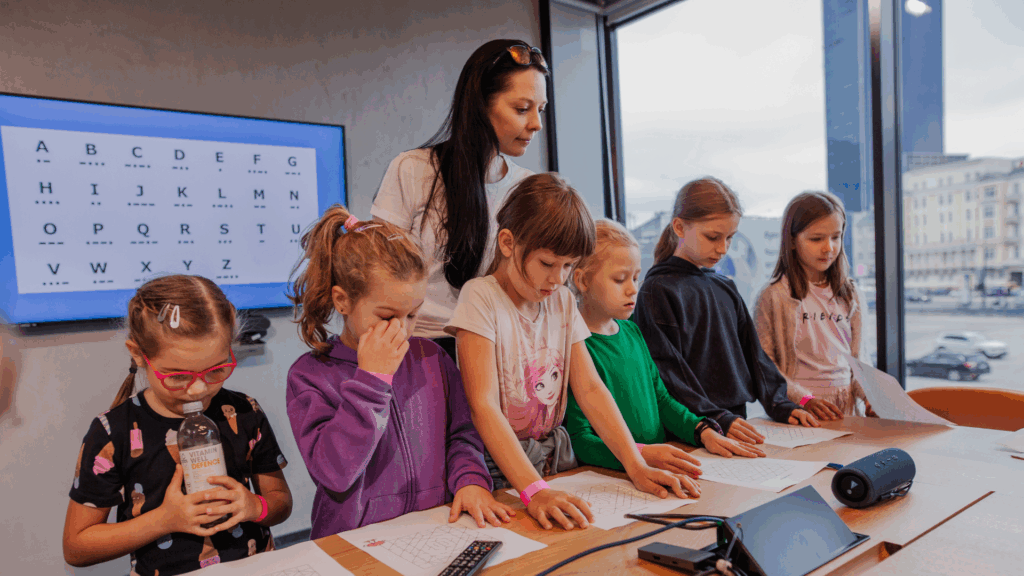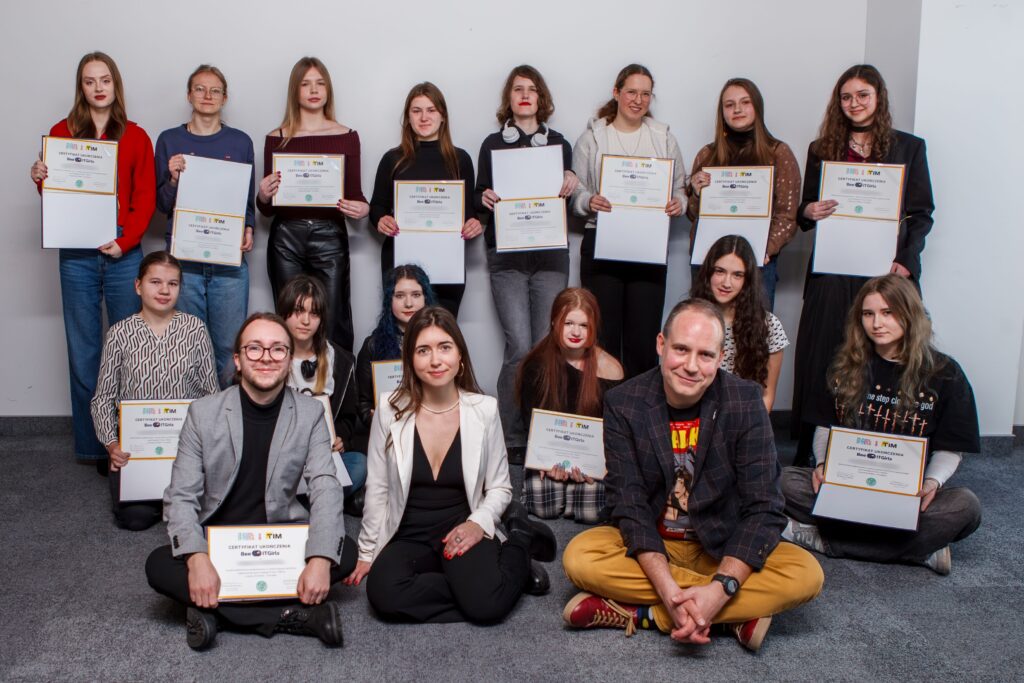
On the occasion of Inspiration Week, we are happy to introduce you to two inspiring women working at our partner company Silevis: Paulina Bała, which plays the role QA Engineers and Victoria Szreder, who holds the position Junior Software Engineers. We talked to Paulina and Wiktoria about the challenges that women working in IT face. You can find the interview below. We encourage you to read it!
QA ENGINEER – Paulina Bała

What advice would you give to women wanting to get into IT?
I would start by thinking about what you really want to do. IT is not just programming, there are many interesting paths that can also be satisfying. There are many reports related to the industry available on the Internet, where you can read which specialists are most sought after. I wouldn't go into something that is losing popularity, or something where there are a lot of specialized people. I would definitely consider that now we will need more specialists in the field of artificial intelligence. Another good source of knowledge can be simply job advertisements. They already have the context of what technologies are in fashion, and I would be interested in those that are repeated most often. On this basis, you can prepare a good learning plan. Often, there are people on industry groups on Facebook who mentor people trying to enter the industry for free. I would definitely skip bootcamps. In my opinion, no one can guarantee that you will find a job after one training.
What is your path? How did you find a job in IT?
I currently work as an automation tester, but it wasn't like that from the beginning. While still studying, which wasn't typically related to IT but was a strict field, I applied for the position of coordinator of a team of programmers. Part of my job at that time was testing the application we were creating. After half a year of working as a coordinator, I tried my hand at an independent position as an application tester and it turned out that this was it. I very quickly got the ISTQB certificate and looked for new challenges related to testing.
Why do you work in IT? What do you like most about this industry?
I work in IT because I really like my job. I like being a tester because it fits my skills and character perfectly. The tasks I perform require me to be meticulous and precise, but also to think, which gives me the feeling that I am fulfilling myself creatively. I like the fact that I work on tasks - they are clearly defined, have a specific deadline, and as for the method of execution, I have a certain margin of freedom, which suits me very well. Having the perspective of working in other industries, I see the difference that people employed here (both men and women) do not compete with each other as much as I saw when working in other positions unrelated to IT. I like this state of affairs very much, because by nature I am not a person who would like to compete with someone for something. I think it is also worth mentioning the earnings. On the Internet, we are attacked with slogans such as "join IT and earn XXX". In my opinion, these slogans should be taken with a bit of distance, but on the other hand, looking at salary reports, IT specialists are very well paid employees.
Have you ever been affected by impostor syndrome? How do you deal with it?
I think it happens to everyone (including me). However, in my opinion, women experience it more often than men (or they don't say it out loud). In my career, I felt it the most when I returned from maternity leave. After almost 2 years, when I returned to work, the world of testing was completely different than when I left it for a while to focus on family life. Technologies had changed, and that was the time when Playwright entered the market with a bang. When I returned and started working on the project, I had a lot of doubts whether I should be here at all. However, with time, more experience and help from my leader, I managed to gain knowledge to work freely, which also increased my self-confidence. My advice: we should think less about how others perceive us, and just do our best.
What skills do you consider most important in an IT job?
I think it is worth focusing on soft skills, because if you have them, sooner or later you will gain the necessary knowledge. In my opinion, the ability to work in a team is very important. The specificity of working in IT is that we work more often as a team, and having problems establishing contact with other people, we can seriously hinder the work of others and harm the project. We need to be able to listen and talk so that the flow of information is good, especially when we work remotely. It is also worth having the desire to learn and readiness to acquire new knowledge. In IT, something new appears almost every month. You need to be up to date with the latest news so that you can solve problems as best as possible and constantly improve your competences. It is also worth mentioning emotional intelligence, we should cope well not only with our own emotions, but also with the emotions of other people.
What are the biggest challenges you have faced in your IT career?
As I mentioned earlier, I am not only a tester, but also a mother. The hardest moment in my career was returning from maternity leave, where everything changed during my absence. After returning, I got a new project, I had to learn how to use new tools, I started working with people I had not worked with before.
What technologies or tools do you like most and why? My absolute discovery in the world of testing and automation is the Karate Labs tool. It is a tool for automating API tests, but not only that. The entry threshold for using it is not high, and the actions that can be performed have a great advantage. Tests can be written in a simple Gherkin format, which makes it easy to understand and create tests even for people without programming experience. The Karate framework allows you to create complex test scenarios that can be run simultaneously.
Do you think the IT industry is changing for the better in terms of gender equality? Why/why not?
In my opinion, the IT industry has indeed undergone significant changes in terms of gender equality. We see women more often in IT companies, but I think there is still a lot to do. This is mainly due to cultural conditions. In my opinion, the problem is not limited to IT, because some people are still surprised by a woman sitting behind the wheel of a bus. I think it is worth supporting interest in technology from a young age.
What advice do you have for women who want to pursue careers in technology but don’t yet have a technical background?
If I were determined to develop in technological areas and had already more or less a specific direction, I would first try to build my portfolio or try to get involved in charity work. This will certainly help to gain some initial experience. It is worth bragging about such things during job interviews.
How can we increase the number of women in IT?
In my opinion, a lot depends on the organizational culture in companies. It is important for companies to want to employ women and promote gender equality. It is also important to offer flexible working hours and the possibility of remote work, which can help women better balance their professional and private lives.
How does your department support women?
I will answer this from the perspective of being a mother. As a mother, I can say that Silevis provides great support in difficult moments. The team I currently work with is very understanding, especially when a child is sick. I have flexible working hours, which allows me to adjust my schedule to the needs of the family. In addition, the company understands how demanding the situation of parenting can be. This kind of support atmosphere really helps to maintain a work-life balance.
JUNIOR SOFTWARE ENGINEER – Wiktoria Szreder

What advice would you give to women wanting to get into IT?
Above all, don't be afraid to take your first steps in a world (for now!) dominated by men. I promise you won't regret it.
Let's be the change, it's worth it!
What is your path? How did you find a job in IT?
For as long as I can remember, I have enjoyed spending time at the computer, and at school, science subjects were not a big problem for me. That is how, after graduating from high school, I ended up at a computer science college, where I did my first summer internship, which introduced me to the industry, and a year later, another one, which resulted in employment.
Why do you work in IT? What do you like most about this industry?
What I like most about IT is the creative element and the ability to solve problems, and additionally the specificity of the industry makes the work flexible and there is a relaxed atmosphere, which also affects comfort.
Have you ever been affected by impostor syndrome? How do you deal with it?
Unfortunately, I often have imposter syndrome. However, it lets up when I have the opportunity to prove myself, which in a developer's job often happens in the form of solving a problem or creating something new and interesting.
What skills do you consider most important in an IT job?
Not so much skills as traits – curiosity, inquisitiveness, satisfaction in solving problems and deriving joy from the process of creating something new. With these traits, you will acquire all the necessary skills in the blink of an eye.
What are the biggest challenges you have faced in your IT career?
For me, the biggest challenge is combining work with studies. It is not impossible – especially in this industry. I study every day. Studies take up a significant part of my time, but thanks to flexible working hours, it does not stop me from developing professionally. Additionally, knowledge acquired at work is often useful at university and vice versa.
What technologies or tools do you like most and why?
Backend is my cup of tea. At first, C# and Dot Net stole my heart, but over time TypeScript and NestJS found their place there too.
Do you think the IT industry is changing for the better in terms of gender equality? Why/why not?
The ubiquitous initiatives supporting women in IT, such as the IT Girls foundation, contribute to equalizing the situation of women and men in IT. Nowadays, a woman working in IT is no longer treated as such a big exception.
What advice do you have for women who want to pursue technology careers but don’t yet have a technical background?
When it comes to the developer position, education doesn't play such a big role here - yes, it helps, but you can do without it. The most important thing is passion and interest in the subject. If you meet these conditions, then a career is open to you.
How can we increase the number of women in IT?
At work, we are all treated equally regardless of gender. What matters is what we bring to the company, not what gender we are. This helps avoid the 'imposter syndrome' that can result from favoring women in the company.
How does your department support women?
Normalizing women's work in IT. We should move away from the belief that it is a male industry, because both women and men have equal predispositions to do such work.
You might be interested

- Dane sondażowe wskazują na rosnące poparcie dla systemowego ograniczenia dostępu do platform społecznościowych dla osób poniżej 16. roku życia. Zjawisko to, napędzane obawami o zdrowie psychiczne młodzieży, wymaga jednak głębszej analizy niż tylko w kategoriach „zakazać czy pozwolić”. Analizujemy obecne trendy legislacyjne w Europie i na świecie oraz zastanawiamy się, jaką rolę w procesie zmian powinna odgrywać edukacja technologiczna i budowanie alternatyw dla świata wirtualnego.

- 11 lutego 2026 świętujemy Międzynarodowy Dzień Dziewcząt i Kobiet w Nauce. To doskonały moment, by zastanowić się, jak my – rodzice, opiekunowie i nauczyciele – możemy wspierać młode talenty w świecie, który wciąż bywa pełen stereotypów.

- Z dumą ogłaszamy zakończenie kolejnej odsłony naszego bezpłatnego kursu programowania dla dziewcząt w wieku 14-19 lat.
Join our community!
What will you find in our newsletter?
- Information about the latest actions
- New product data
- Details about the workshops
- Offer validity dates
KRS: 0000921737
NIP: 1182228955
REGON: 38998779500000
Website created by Digital Competence Foundation

 Return to blog
Return to blog